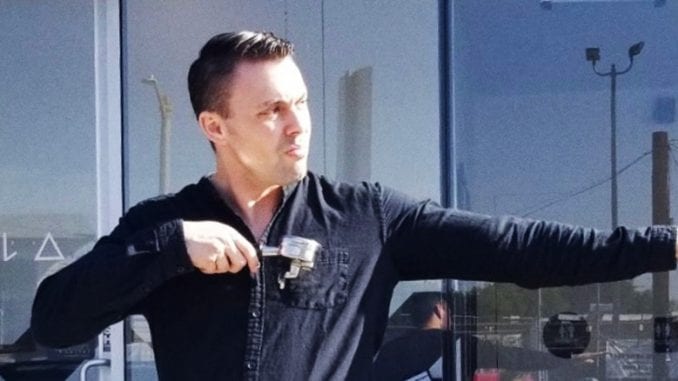
After working as a barista in Brazil, Californian Alex Kipling built a bridge connecting this country to his homeland—a bridge made of coffee.
BY PAULO PEDROSO
SPECIAL TO BARISTA MAGAZINE ONLINE
Photos courtesy of Alex Kipling
Los Angeles recently got a new spot to enjoy fine coffees and an amazing assortment of São Paulo, Brazil’s typical coffee shop snacks: S P L A. The name carries the initials of the two cities that are most loved by its founder, Alex Kipling. According to him, the community has been very receptive and curious about the space, which is a celebration of the exchange of culture between Los Angeles and São Paulo. In this interview, we ask Alex about balancing and combining the two coffee cultures in one space.
Paulo Pedroso: Could you tell me about yourself and your earliest coffee experiences?
Alex Kipling: I am 31 years old and grew up in the L.A. area (was born in San Diego). I also lived in Portland, Ore., for three years and lived a summer in Rio de Janeiro and 1.5 years in São Paulo. My first job in coffee was working for Swork when I was 17 (2004/2005). This was one of the few L.A.-based coffee shops that were using Intelligentsia for their coffee program. Unfortunately, I was too young to take full advantage of this opportunity, but this is where my journey began.
After working at a few other shops in L.A., my experience in the specialty industry truly started with Coava Coffee in Portland. I began to learn about the nuances between the different coffee origins and roasts; I started to understand coffee as an agricultural product and how most of the development of the fruit begins on the farm.
At Nossa Familia Coffee in Portland, under the direction of Augusto Carneiro and Rob Hoos, I developed a firm understanding of the farm-to-cup process and led the wholesale and sales department of the company. In 2015, I had the amazing opportunity to travel to São Paulo to help open up Isso e Café with Felipe Croce and FAF Coffees. This was the most eye-opening experience in my coffee career and was the backbone to my development of S P L A.
In 2017, I opened Nossa Familia Coffee’s first L.A. coffee shop in the Callison Building in Downtown Los Angeles and now, in 2018, I opened S P L A in Chinatown, Los Angeles.
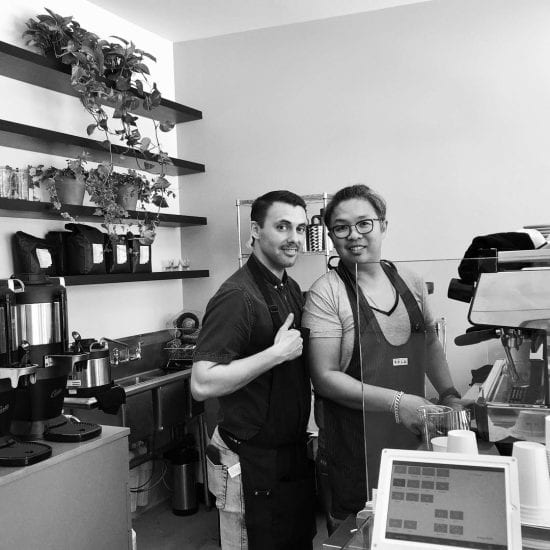
PP: Why did you decide to connect the coffee cultures of São Paulo and Los Angeles in your new café?
AK: In the summer that I spent in Rio de Janeiro in 2011, I studied the complexities of the city’s urban planning and social network. When I helped FAF Coffee to launch Isso é Café, I was so inspired by the drink nuances, proximity to the farms and urban culture that I began to envision a café back home in L.A. that could showcase a piece of this experience. I had the incredible opportunity to visit farms, meet the producers, and work alongside some of the most cutting-edge farm directors and baristas within the country. I also got a hands-on experience of converting an under-utilized space in downtown São Paulo to a fully operational coffee shop/restaurant/cultural center.
I also helped train some other stores and made friends with a lot of the local roasters and coffee shops. With all of these interactions and experiences, I began to visualize opening a space back home in L.A. that could bring a piece of this Brazilian/Paulistano culture that I had encountered and embraced while living and working in the heart of São Paulo. With S P L A, my idea was to share to the L.A. community the specialty coffee and urban culture directly influenced by my day-to-day experiences in the city of São Paulo.
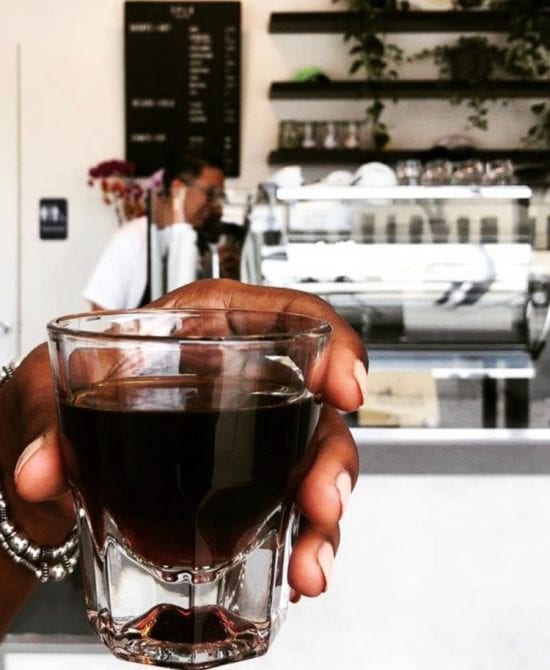
PP: Can you tell me a little about the work you’re doing now in S P L A? Who are some of the people you work with?
AK: For our coffee program, we partnered with Miami’s Panther Coffee to showcase some amazing Brazilian coffees and work with a roaster that also has strong roots to the Brazilian coffee scene (Leticia Pollock, the owner of Panther Coffee, is from São Paulo). With their incredible sourcing practices and high quality standards, Panther Coffee was a very exciting opportunity for us, and they have been terrific in their support and dedication to our fun, Brazil-focused coffee program.
PP: Do you intend on keeping Brazilian beans regularly on your coffee menu?
AK: Panther Coffee will continue to be our main roaster on bar. In the future, we intend to be an all-Brazilian microlot coffee shop. Currently, we offer a blend for our espresso (Brazilian pulped natural/Ethiopian washed/Sumatra hulled), and our batch brew is an amazing, chocolate fudge-filled Brazil and a rotating single-origin (right now: Nicaragua and Ethiopia). We will begin sourcing our own coffees starting next year.
PP: How are your clients receiving Brazilian snacks like pão de queijo (a bread snack with cheese) and brigadeiros (a kind of chocolate candy)?
AK: It has been such a fun adventure introducing customers to Brazilian foods and coffee beverages. One of our most popular drink items is the “Batida”; this is our take on a popular São Paulo nightclub/bar drink that we transformed into a tropical coffee smoothie. It’s made with condensed milk, coconut cream, fresh fruit, and iced coffee all blended together—this is a great drink for the hot weather that we face year-round here in L.A.
All of our other specialty drinks are based off of recipes both within the Brazilian specialty-coffee industry and from our own creative twists on everyday Brazilian cultural icons. For example, the “Sabotage” was inspired by Brazil’s and São Paulo’s late rapper, Sabotage. This is our version of a mocha, with espresso, chocolate and steamed milk, but we add a fresh fruit purée and spice it up with cayenne pepper, cardamom, and Tajin.
On the food side of things, we offer an assortment of delicious pastries from Bread Lounge—along with pão de queijo, which we serve with fresh farm honey and guava jam, we serve a toasted bread with apricot jam (pão na chapa).
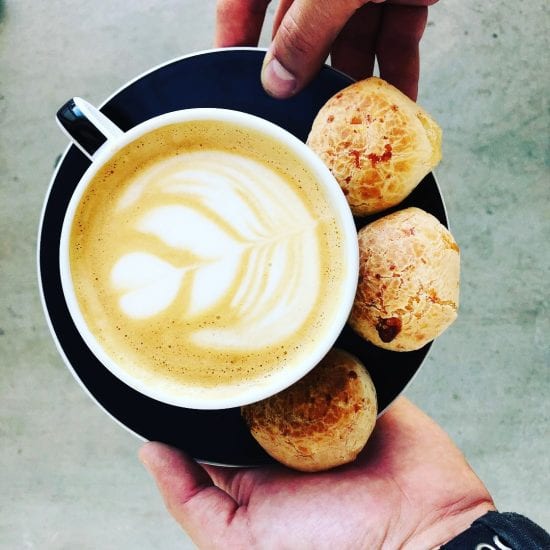
Although some of the pronunciations can be challenging, L.A. is a city of vibrant cultures, languages, and ethnicities; the community here is very receptive and curious. So bringing in some Brazilian coffee and culture to the Downtown/Chinatown community has been very well-received!
PP: How does the coffee scene between São Paulo and Los Angeles differ?
AK: With a variety of quality-oriented coffee shops serving coffees directly from the nearby farms, it is harder to find a more intriguing coffee scene that what is going on in São Paulo. These roasters and shops are finding a clientele that is eager to embrace these new traditions. However, most of Brazil, due to financial restrictions, lack of accessibility, or simply staying within tradition, is yet to experience the blossoming specialty-coffee scene in Brazil.
In Los Angeles, specialty coffee is also in its early days. For years, the market here was oriented toward bigger-name companies and, until recently, independent, smaller businesses were not trending. However, as we have seen within the last five years, specialty coffee has exploded in L.A. and, with all the different backgrounds and cultures in the industry, there are so many different shop experiences. With S P L A, we join the forces of the eclectic coffee scene in this city!
PP: The Brazilian influence in your café is clear, but where does the L.A. touch come in?
AK: I think there are two essential elements that would finalize our vision for S P L A. First, sourcing unique Brazilian coffees from our friends and partners in Brazil and roasting them here in L.A. Although we love our current program with Panther, we are so interconnected with the coffee scene in São Paulo and are very close to several farm producers/directors. With these relationships, we want to hone in on an all-Brazilian microlot program that competes with the very best coffees found in coffee shops throughout Los Angeles. So expect to see us starting to roast after the new year.
Second, we will continue to build on and establish a community between both urban cities, São Paulo and Los Angeles. We are engaging two very distinct crowds, separated by thousands of miles, as well as language and cultural barriers. This is definitely a challenge, but one that is very stimulating, and we are excited to look into many avenues to connect both groups to the same vision that we have for S P L A. This means a lot more trips to origin (Brazil) and to São Paulo so that we are in a state of constant innovation.
This story was edited for clarity.
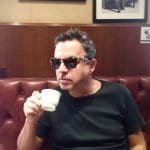 ABOUT THE AUTHOR
ABOUT THE AUTHOR
Paulo Pedroso is a Brazilian entrepreneur who is a regular contributor to several newspapers and magazines. He always keeps an eye on the increasing reach of specialty-coffee culture and the trends and life stories that emerge from this phenomenon.

